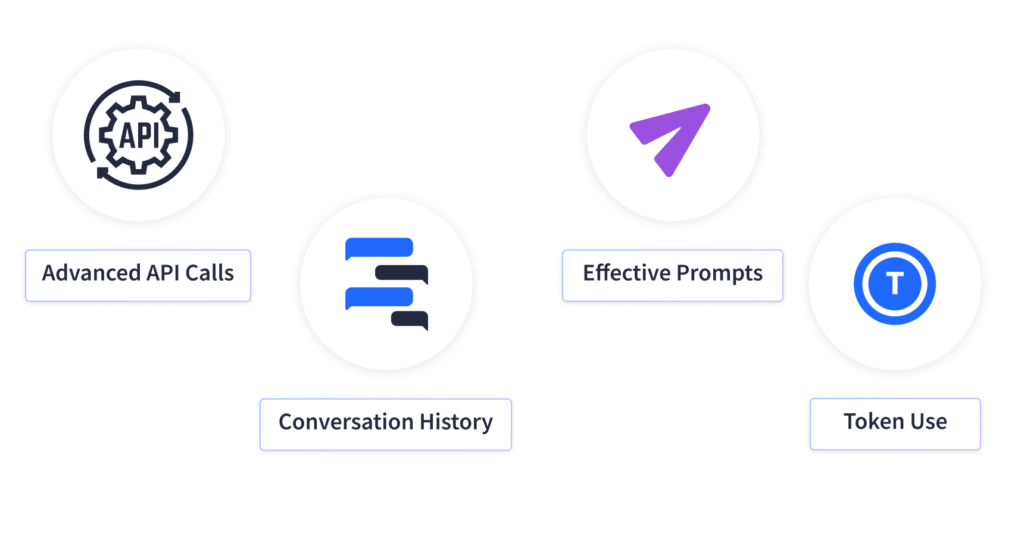Why Prompting Large Language Models in Python is a Must-Learn Skill
Proficiency in working with Large Language Models (LLMs) is no longer optional...it's a required skill for data professionals. Recognizing this, Dataquest introduces the "Prompting Large Language Models in Python" course, a practical guide to working with Python and OpenAI's Chat Completions API. This isn't just about building an AI chatbot; it's about future-proofing your career.

As AI-driven technologies increasingly dominate the job market, knowing how to interact with LLMs is not just a skill, it's a necessity for staying relevant in your career. This blog post will explore the importance of prompt engineering, who will benefit from this course, and its practical applications. By completing this course, you'll gain proficiency not only in chatbot creation but also in applying AI innovatively across various domains.
For those looking to leverage AI with Python and take their career to new heights, joining this course is a wise move. Here's what makes prompt engineering an essential skill today and how Dataquest can help you excel at it.
Why Learning Prompt Engineering is Important
The creation of our "Prompting Large Language Models in Python" course was inspired by the critical industry need for prompt engineering skills. As artificial intelligence cements its place in business operations, the expertise in designing effective prompts for AI is more sought after.
Here's why acquiring prompt engineering expertise is vital:
-
Industry Insights: A report from Synoptek emphasizes the importance of precision in prompts to garner relevant and robust AI responses, evolving AI interactions from merely possible to genuinely insightful.¹
-
Market Growth: The CB Insights' report reflects an expanding market for services using large language models, such as content generation and sentiment analysis, underscoring a growing demand for proficient practitioners.²
-
Career Opportunities: Job prospects for those skilled in LLM operations are expanding, with LinkedIn's Future of Work Report highlighting a general optimism about AI's role in enhancing career opportunities across various sectors.³ Proficiency in prompt engineering provides a competitive advantage, especially in fields that rely on natural language processing and AI.
-
Skill Development: Our course is designed to prioritize skills that prepare learners for practical applications in the real world, an essential aspect given the foundational role of prompt engineering in AI interactions today and in the future.
-
Practical Advantages: Our course offers an integrated learning experience where learners can both run and deploy projects on the platform. It utilizes the syntax of OpenAI's Python library with our open-source model, providing a comprehensive and accessible learning experience that ready learners for swift real-world application.
Mastering prompt engineering positions you at the forefront of current industry trends and equips you for up-and-coming job opportunities. It represents a strategic move to keep up with the rapid pace of the tech-driven job market.
Who is this Course for?

The "Prompting Large Language Models in Python" course is crafted for a diverse group of professionals eager to integrate AI into their careers, overcome the risk of job displacement, and stay competitive in a tech-driven market. According to reports from organizations such as the World Economic Forum and LinkedIn, analytical thinking, AI proficiency, and big data are key skills for future job markets, with AI offering optimistic enhancements to career prospects across numerous sectors.³⁻⁴
Below, we highlight three learner profiles who will benefit from this course and how it can enhance their employment opportunities.
AI Enthusiasts: Expanding Skills
Are you passionate about AI and looking to shift into a role that emphasizes its use? This course is crucial for you. Take educators as an example; by learning to create AI-powered educational tools like chatbots, they become attractive candidates for edtech companies and innovative learning organizations.
Software Developers: Advancing Expertise
For software developers with Python knowledge, this course offers an opportunity to specialize in prompt engineering. By honing the skill of crafting effective prompts, developers can build sophisticated conversational interfaces, making them valuable assets to tech companies integrating AI into customer experiences.
Entrepreneurial Innovators: Pioneering with AI
Entrepreneurs planning to leverage AI in new ventures will find this course particularly beneficial. Learning to effectively prompt large language models equips them with the ability to quickly prototype AI-based applications, giving them an edge when seeking investment or entering competitive markets.
Overall, the course addresses concerns about maintaining relevance in a rapidly advancing technological landscape while seizing the opportunities that come with AI proficiency.
Who Might Not Benefit from this Course?
The "Prompting Large Language Models in Python" course is a practical, hands-on guide to interacting with AI. However, it's not the best fit for everyone. Let’s look at who might consider looking elsewhere:
-
Theoretical AI Scholars: If you're deep into AI theory, focusing on algorithmic underpinnings or academic research, this course may not align with your needs. It's crafted for practical application, not theoretical exploration.
-
Non-Python Coders: If you’re not versed in Python or prefer other programming languages, this course assumes a level of Python proficiency that may be beyond your current scope. If you don't have these skills yet, no problem! You can build these skills by enrolling in our Generative AI Fundamentals in Python path which includes this course.
In short, the "Prompting Large Language Models in Python" course is tailored for those seeking practical AI application skills within a Python framework. If your career path or interests lie outside these realms, other educational resources may serve you better.
What Will You Learn?
Learn the essentials of AI with our "Prompting Large Language Models in Python" course. You'll start by using OpenAI's Chat Completions API to communicate with a large language model, then you'll build a fully-functional AI-driven chatbot to communicate with the model. From there, you'll apply fundamental prompting techniques, using the chatbot that you built.
Unique to this course is that it uses an open-source large language model hosted by Dataquest. This resource mirrors tools used by top AI organizations, allowing you to learn without proprietary models or API keys.
Key skills you'll acquire:
- OpenAI API Mastery: Lead AI ecosystems with proficiency in handling AI tasks via APIs.
- Conversation History Management: Develop chatbots that maintain coherent, context-aware dialogues through effective conversation history management.
- Prompt Engineering Techniques: Master the art of crafting structured prompts to generate high-quality AI responses, optimizing your AI's conversational and analytical capabilities.
- Token Management: Implement economically efficient token usage to optimize API calls and manage resource allocation for AI applications, helping create sustainable and cost-effective solutions.
You'll apply these skills in a guided project, creating a dynamic AI chatbot that showcases your ability to build real-world AI solutions.
Course Focus and Boundaries
We've designed the content to give you a solid foundation in LLMs while avoiding unnecessary complexity. Advanced topics like model architectures and fine-tuning are not covered. Instead, we concentrate on how to use existing models through APIs, making the course practical for those without an extensive background in machine learning or systems engineering.
Prerequisites for Success
Before starting the "Prompting Large Language Models in Python" course, you should have:
- Python Basics: Be comfortable with Python syntax, loops, conditionals, functions, and data structures.
- Object-Oriented Programming: Some understanding of OOP principles will be helpful.
- Error Handling Experience: Ability to manage and debug code errors.
- API Familiarity: Understanding of how APIs work.
These prerequisites form the foundation for the course material. You can build these skills by enrolling in our Generative AI Fundamentals in Python path which includes this course.
Your Path Forward
After completing this course, consider these next steps to further your learning:
- Dynamic Python Applications: Move on to "Designing Dynamic Python Applications with Streamlit" for practical web app development skills.
- Deepen AI Knowledge: Explore advanced machine learning or transition into specialized areas like natural language processing (NLP) and computer vision.
- AI Governance and Ethics: Gain insights into responsible AI practices.
These recommendations are designed to expand your AI skill set and prepare you for a future where such expertise is crucial.
Real-world Skills You'll Gain

By completing the "Prompting Large Language Models in Python" course, you will be ready to apply AI in practical settings. Completing this course propels you into varied AI applications. Whether improving customer service with chatbots or enhancing content creation workflows, you'll leave equipped with immediately applicable skills for innovation across digital technology sectors. You'll have the skills to:
- Execute Advanced API Calls: Handle complex interactions with AI models via APIs.
- Manage Conversation Histories: Keep track of dialogues to ensure smooth conversations with AI.
- Design Effective Prompts: Create prompts that produce precise and useful AI responses.
- Optimize Token Use: Allocate API tokens wisely for cost-effective operations.
Applying Your New Skills
Professionals from various fields can use these skills to enhance their work:
Entrepreneurs can prototype AI applications quickly, giving their startup an edge in securing investments and entering new markets.
Market Analysts will automate tasks such as summarizing lengthy reports or analyzing social media trends, speeding up data-driven decision-making.
Customer Support Managers can deploy custom chatbots for routine queries, boosting customer satisfaction while cutting costs.
These examples underscore how the course provides hands-on skills that you can immediately put to use in your career.
If you're already a data professional, you might be interested in reading our post on Prompt Engineering for Data Professionals.
Why Learn Prompt Engineering with Dataquest
Dataquest stands out from the crowd by offering a practical, browser-based learning environment. Our "Prompting Large Language Models in Python" course is designed to be accessible and straightforward, eliminating the hassle of complex setups or additional software. This means you can focus on acquiring and applying new skills immediately.
Unlike other platforms, our course uniquely combines OpenAI's Python library syntax with an open-source model directly available on Dataquest. This allows you to practice prompt engineering without needing an API key or OpenAI account, making AI education more accessible to everyone.
What sets our course apart is its focus on real-world application. You'll progress through lessons that culminate in a capstone project: building a dynamic AI chatbot from the ground up. This project-based approach ensures that you gain valuable experience in applying AI in practical scenarios, whether for tech roles or entrepreneurial projects.
Tips for Maximizing Your Learning Experience
To get the most out of the "Prompting Large Language Models in Python" course, we recommend:
-
Join the Dataquest Community: Engage with peers and mentors by participating in discussions and group projects. Sharing insights and seeking feedback will deepen your understanding.
-
Practice Promptly: Apply what you learn to real-world challenges right away. Immediate application cements your knowledge and enhances your problem-solving skills.
-
Create a Showcase Portfolio: Use the capstone project to demonstrate your ability to build functional AI chatbots. Include this work in your portfolio as concrete evidence of your capabilities.
By embracing these strategies, you'll not only learn prompt engineering but also be ready to use these skills effectively across various professional settings, giving you an edge in today's AI-centric job market.
Take the Next Step in Your AI Career

The "Prompting Large Language Models in Python" course is your pathway to mastering a skill set that's in high demand within the AI-driven job market. By completing this course, you'll be equipped to apply AI practically, from developing intelligent chatbots to enhancing content creation workflows.
We encourage you to enroll and enhance your technical skills, positioning yourself as a leader in AI innovation. This course will guide you through prompt engineering and API interactions with LLMs, unlocking new opportunities for career growth—whether it's improving customer experiences, streamlining business processes, or spearheading technological breakthroughs.
Take charge of your professional future by acquiring these vital skills now. Join Dataquest and transform your potential into tangible achievements. Enroll today and step confidently into the role of an AI-proficient professional prepared for the challenges and prospects ahead.